
This lesson teaches you why eCommerce blogging is important for an eCommerce store and what are the critical steps in creating a successful eCommerce blog post.
We will also show you several examples of eCommerce blogging done right, so you can get a better idea as to how to write high-quality blogs for an eCommerce store.
This all sounds reasonable, right? But, do you still ask yourself why you should put all so much effort to understand eCommerce blogging skills?
Let’s take a look at the big picture for a moment:
Writing numerous quality blog posts can establish your eCommerce blog as an authority in your niche that customers trust and search engines love. This is not easy to achieve, but it is also not impossible and it is definitely something to strive for.
Why would you strive to build an authority eCommerce blog in a niche?
Being able to do this makes you an incredibly important asset to any eCommerce store owner. This knowledge and skill turns you into a copywriter with special skills and that is a promise of much better prospects on the job market.
Let’s say you have a Mercedes car and it broke down. You need a mechanic and you have two choices. The first person says:
“I can take a look at your car. I have a shop nearby and I’ve been working for a while now. I fix all sorts of cars – anything that comes through the door of my shop, really.”
And the second person says:
“I have been a mechanic for over 10 years and I have only specialised in Mercedes cars. I spent most of my career working for the official Mercedes service team in our town. Take a look, we’ve even received a special recognition from Mercedes headquarters for offering the most efficient service provider in the region.”
So, which mechanic would you pick and which one would you be willing to pay more? Whose tips would you share with your friends and whom would you recommend? The second one, of course.
Why? – Because he is a professional that is recognised and established in his niche and you trust him to do the good work.
Once you complete this training, become specialised in eCommerce blogging, you will be the one that stands out among other, generalist copywriters and the obvious choice for any eCommerce employer.
But, first thing’s first – let’s go back to the basics.
After going through this lesson which features the basic concepts about eCommerce blogging and the reasons behind it, you will be well-equipped with the necessary knowledge to be able to get the most out of the lessons that follow. Each lesson will take you through the details of eCommerce blogging stages, all the way from the planning to the publishing stage.
First step is understanding why is blogging for eCommerce so important and what you, as an eCommerce copywriter need to know.
Importance of Blogging for an eCommerce Store
An eCommerce store blog is like an open, inviting doorway for both customers and search engine web crawlers that allows them to take a close look at your eCommerce store and make their decision about how relevant it is.
- In the case of potential customers, that decision is usually whether or not they trust you enough to become your customer, or at least, do they find the content of your website interesting enough to be shared with others.
- In the case of web crawlers, that “decision” actually results in ranking your website in the search engine results.
Therefore, the eCommerce blog is a tool that can help build the brand and inspire your visitors to form a positive impression with regard to your online store.
It is also an opportunity to showcase many different aspects of the product sold in the eCommerce store you are writing for.
You have a better idea about why is eCommerce blogging important, right?
Either way, we’ll go into some more details and explain this concept by illustrating further to make it clearer.
An eCommerce Blog Creates a Personality for Your Brand
The personality of your brand needs to be reflected in the tone of your eCommerce blog. It also needs to be appropriate for your product and your target audience.
For example, Stampd sells high quality sports clothing. Those high-quality products meant for people that take their sport very seriously. Therefore, the tone used in their blog posts helps them maintain the image of a highly professional brand.
They use words such as evolution, contemporary, innovation, performance, function, technical design, tech shell and similar vocabulary to describe their clothes. It is very appealing to their target audience.
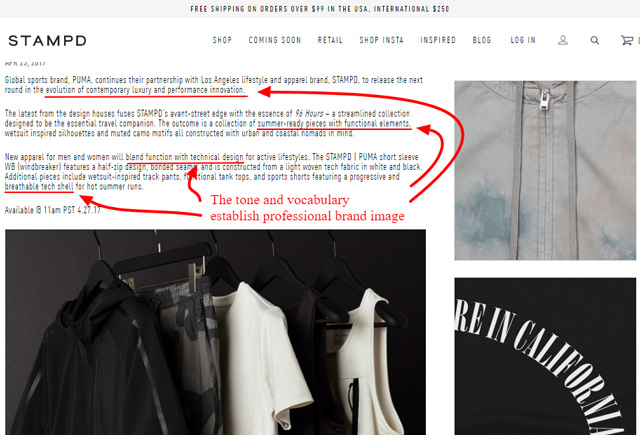
On the other hand, Noodooll has a fun product, as they sell dolls made of noodle. Quite appropriately, their blog has a playful voice and appeals to the children and their parents alike.
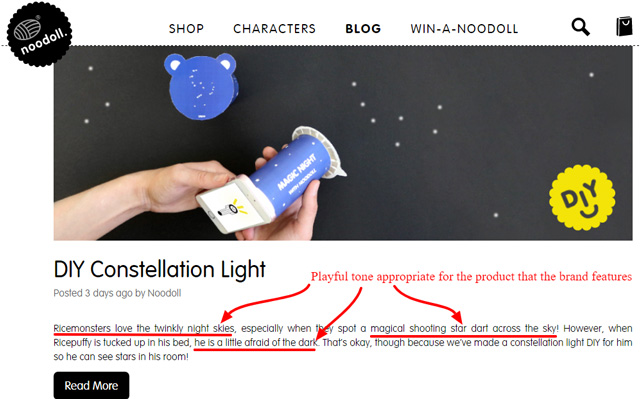
The text mentions twinkly night skies, magical shooting star and a Ricepuffy who is a little afraid of the dark. This tone makes parents want to learn more and have a positive attitude toward the product and the brand itself.
Your eCommerce blog can send a message to your customers about the values and the mission of your eCommerce store, rather than simply promote the product you are selling. This adds to your brand promotion and also increases customer loyalty.
An eCommerce Blog Educates Your Customers About Your Product and Industry
What makes your product stand out from the sea of other similar product on the web? You may know the answer to this question, but your customer doesn’t. Having a great eCommerce blog can help you inform and educate your customers.
You can achieve this through different blog article types. You can use listicles and product comparisons, how-to articles and many more. All of them can paint a picture about your product in your customer’s mind and make it more relatable and useful for them.
In this example, you will see only two articles from the Bonnie & Clyde eCommerce blog. This eCommerce store sells supplements for pets.
Here, you can see a listicle that offers tips to keep dogs safe and healthy. One of those tips definitely involves the eCommerce store products.
The other article is the “how-to” type of article in which the customer can find explanations on how to prevent a medical condition with your dog. Again, by including their product in this guide, this eCommerce displays another aspect of their product.
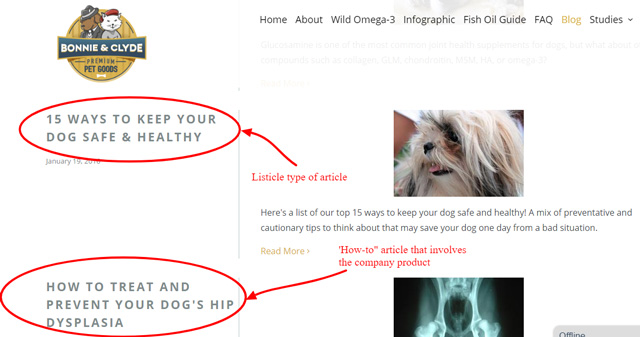
An eCommerce Blog Allows You to Repeat Your Message in an Interesting Way
Saying over and over again how amazing your product is gets really old, really quickly. You have to find a way to repeat your message but with a slightly different twist, so that it looks new every time.
Creating different blog posts to achieve this is the best way to do it, which is yet another reason why eCommerce blogging is so important in a store.
Take a look at Everything Displays list of blog posts and note how different blog posts deal with different aspects of their product, but they’re still talking about displays in one way or another.
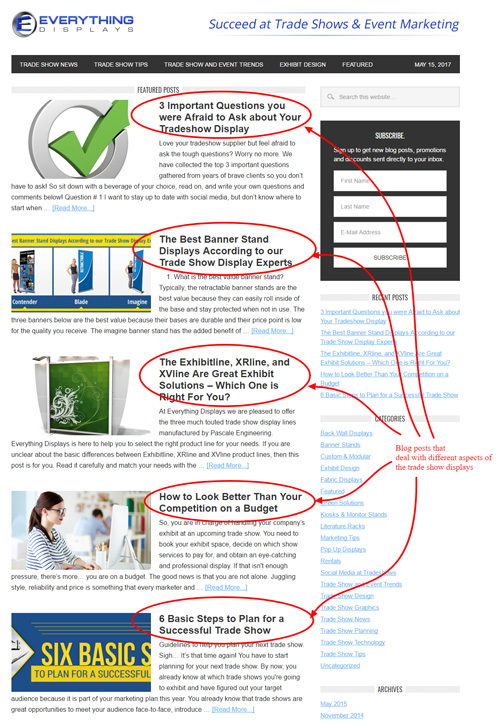
When you take a closer look, each of these blog posts comes down to trade show displays and their quality. Still, the topics are different. One blog post compares two types of displays, other suggests a great trade show plan involving high-quality displays and the third one teaches businesses how to look great on a budget – again – by cleverly using their displays as the core topic.
eCommerce Blog Helps People Decide to Make the Purchase
Here are some of the interesting numbers and percentages that will show you how much your eCommerce blog matters.
- According to HubSpot, 79% of online shoppers spend at least 50% of their time researching the web for products. If they land on your eCommerce blog and get high-quality content and all the answers to their concerns, they are more likely to get converted to customers.
- eCommerce blogs have become the new, very powerful form of advertising. Potential customers are more likely to learn about a company through a blog than other forms of advertisement.
- People don’t just learn about the eCommerce companies online, but about the products as well. This study conducted by BlogHer shows that 87% of their own customer sample made a purchase based on blog recommendations.
- Blogs influence the purchase more than social media. They are on the third place on the list of sources that influence the purchase, right after retail sites and brand sites.
31% of customers trust blogs to influence their buying decision #contentmarketing #socialselling pic.twitter.com/4cisVckgEZ
— Gerry Moran (@GerryMoran) June 12, 2014
An eCommerce Blog Gives a Reason to Get and Share Links With Other Traffic Sources
Not all of your visitors will come from Google and other search engines. A certain number of your customers will come from other blogs and websites in general. However, it is highly unlikely that another blog will simply link to one of your products, unless your product is incredibly unique or remarkable.
Take Leisure Shop Direct for example. There are hundreds of eCommerce websites that sell apparel for caravans, so why would somebody link to their precise product? It’s highly unlikely to happen. But, if there is a blog post like: Gifts for the Motorhome Owner & Caravan Gift Ideas it is more likely to be shared.
It is interesting and entertaining and provides value for the target audience. If others share the blog post, it increases the chances for their customers to become your customers, as well.
An eCommerce Blog Is a Great Way to Add Keywords to the Website
Having a lot of relevant and well-placed keywords on your eCommerce website helps search engine ranking. However, when you write your product page, you can use your keywords a limited number of times, if you want to avoid keyword spamming.
Your eCommerce blog allows you to use the relevant keywords in different aspects and, in that way organically include a lot of keywords without being to repetitive and you can approach the topic from different aspects.
For example, if you take a look at MyHydrate eCommerce store that sells specific smart hydration system in a form of water bottle cap. Since they have only a couple of products in their range, they can only write one descriptive text about each of them and that’s it.
However, when they have a blog, they can write about many different things that concern their product and increase the amount of content, as well as the among of relevant keywords on their eCommerce website. On their product page, you can see the keywords that are in relation to the product: hydration, spa infusers, bottle, water intake, etc.
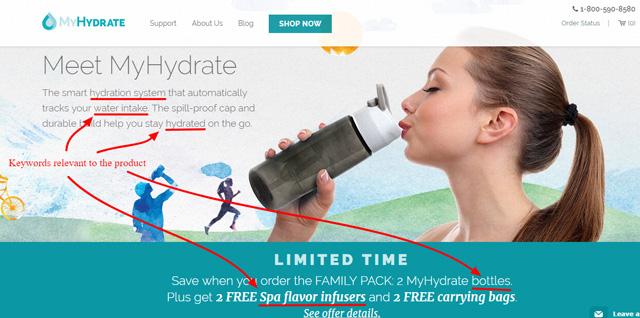
But, on their blog, you can see the same products mentioned in slightly different contexts and the keywords used in a way the features the product’s different aspects.
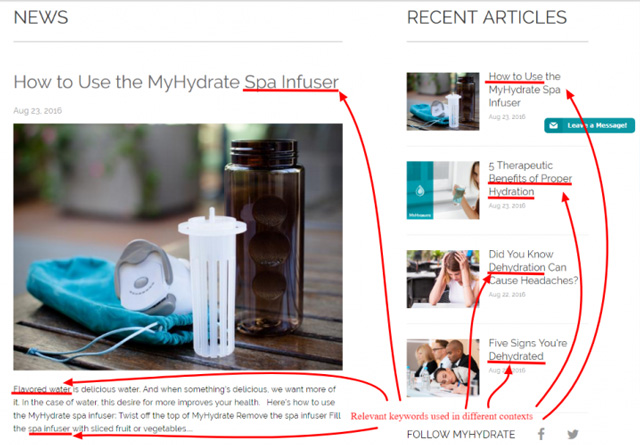
It is not just spa infuser anymore – now it is how to use sp infuser; it’s not just hydration it is benefits of proper hydration, water intake has something to do with flavoured water, and so on.
An eCommerce Blog Allows You to Create More Inbound Links
Creating inbound links (e.g. linking from one page in your store to another page in your store) is good for your eCommerce blog because it helps the webcrawlers inspect your page and that is a crucial part of increasing your search engine rankings.
When webcrawlers visit your page, they inspect the links on it. If you do not leave enough inbound links, the webcrawlers will not be aware that there’s more of your website they need to visit and that means that they will not go through them, which reflects badly on your rankings. Imagine you want to sell your big house that has 20 rooms.
Webcrawlers are like agents that need to visit each and every corner of your house, so they can take pictures and recommend it to your potential buyers.
If you only have one door to your house and there are no doors between your rooms, the agents won’t be able to see the entirety of your lovely home and they won’t be able to recommend it well. However, if you build many doors in between all the 20 rooms, inspecting all of them will be easy and your agents will do a very good job at your promotion.
Now, those doors are the inbound links in your eCommerce blogs. Therefore, place them smartly and abundantly.
An eCommerce Blog Increases Traffic to the Ecommerce Store Website
Another very important function of an eCommerce blog is the fact that it can drive more traffic to the eCommerce store.
The graph below shows a huge difference between companies that blog and those that don’t. If you want to get leads (that can possibly become customers) via the search engines, you would definitely want to be among those that DO blog because there’s bigger variety of opportunities.
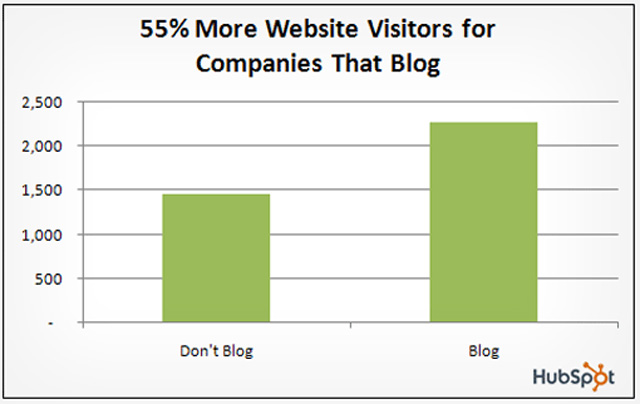
As per HubSpot’s ebook mentioned:
“Small businesses with blogs get 55% more website traffic, and that number goes up exponentially whether you post once a week, twice a week, and then up to several times a day – wherein you become a thought leader in your field. Our advice? Blog as often as you can while keeping the content valuable for your prospects.”
Now that you truly understand the reasons behind effective eCommerce blogging and what it can do for an eCommerce business, let’s teach you how to create it.
Steps to an Effective eCommerce Blog
If you are just about to start your very first blog post, here are the steps you need to take to make your blogging more effective for your eCommerce business:
Step 1: Focus on your target audience – This is extremely important if you want to be successful. You have to know WHO you are writing for. It is a critical part of your planning phase.
Step 2: Choose an interesting headline – Coming up with a catchy headline is something that’s a must. Remember that this is the first thing that people read. It has to grab their attention immediately.
Step 3: Write in an appropriate style – According to some research, your writing style should be on a sixth grade readers’ level. A blog post is most commonly read during breakfast or first morning coffee time. It shouldn’t be too demanding, but on the contrary, a pleasant and relaxing activity. Keep it simple!
Step 4: Think about your blog design – Try to design it to be appealing and user friendly so that your readers can find the posts and images easily. And of course, think about the colour scheme. It should be related to your general idea of the blog, i.e. what you are writing about.
Difference Between Blogging and Blogging for eCommerce
Anybody who has a PC, the access to Internet and some free time can start a blog, but that doesn’t make them an eCommerce blogger. People create it to share their thoughts, experiences, and hobbies. The purpose of these blogs is usually entertainment.
Does that mean that these types of blogs don’t earn any money? Not always.
Sometimes, when these bloggers establish themselves as influential, certain companies offer them payment to write reviews and opinions on their products. These types of bloggers can also make money through affiliate networks and programs and many other ways.
As an eCommerce blogger, you are not writing your own blog, but you are creating content for a business and your blog has a very different purpose than the aforementioned blogs.
Even when you take a look at an eCommerce blog and any other blog, the difference is obvious: This is the homepage of the Zing Anything eCommerce store that sells water bottles.
Everything about the appearance of this page suggests that it is an eCommerce blog, rather than a personal blog.
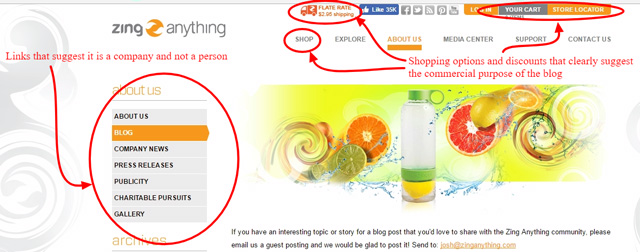
This is a personal blog Holly Would If She Could which is definitely NOT an eCommerce blog. The images, topics, the lack of the shopping option and the description all suggest that this is not a commercial blog. It is there to entertain and share personal experiences and opinions.
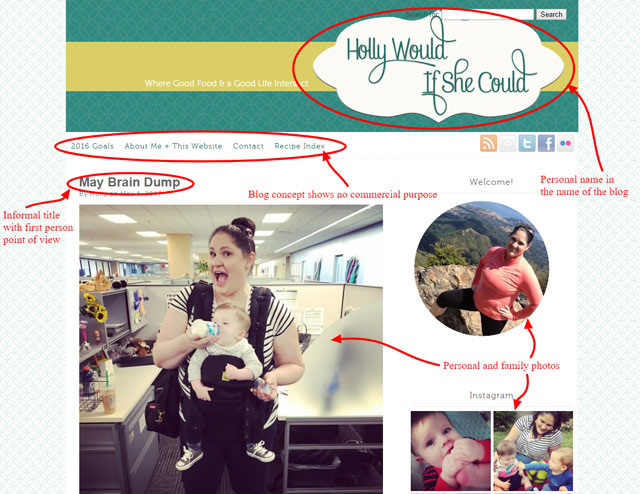
Sometimes, this difference is not that obvious at first glance. Take a look at the Kitchen. It doesn’t have just one writer and it is not a personal blog, but still, it is not an eCommerce blog. Can you tell? How?

Precisely! There’s nothing to buy here! This blog earns money by affiliate programs and selling advertising space which means that they just need to generate a lot of good content to gain traffic. But, there is no product that you can buy.
Now that you have a good idea about this difference, let’s sum them up!
Some basic differences between an eCommerce blog and other types of blogs include:
1. Purpose of the blog
This is the first and the most obvious difference between these two types of blogging. eCommerce blogs should generate traffic, promote the products sold by the eCommerce store and improve the rankings of the eCommerce website. It is not a purpose to itself – it serves the eCommerce store.
Zing Anything blog doesn’t stand alone. It is a part of the Zing Anything online store and it would not make much sense if it were a separate website.
On the other hand, different entertainment, hobby or other types of personal blogs are autonomous websites. They are not an addition to any other website but stand-alone, regardless if they are commercial or not.
Holly Would If She Could is about Holly’s life events, her love for her family, cooking and an occasional product that she finds interesting. It doesn’t generate traffic for a store.
2. Blog post types
eCommerce blog types will include a lot of “How-to” articles that explain how to use the products offered by the eCommerce store. They will include listicles with reasons why to use those products. eCommerce blog will involve product reviews and comparisons, as well.
Here is how Zinger Anything writer a product review of their own product.
They are offering Insider Tips for Using Your Zinger that showcase different advantages of their bottle and educate the user about it, so their experience is better.
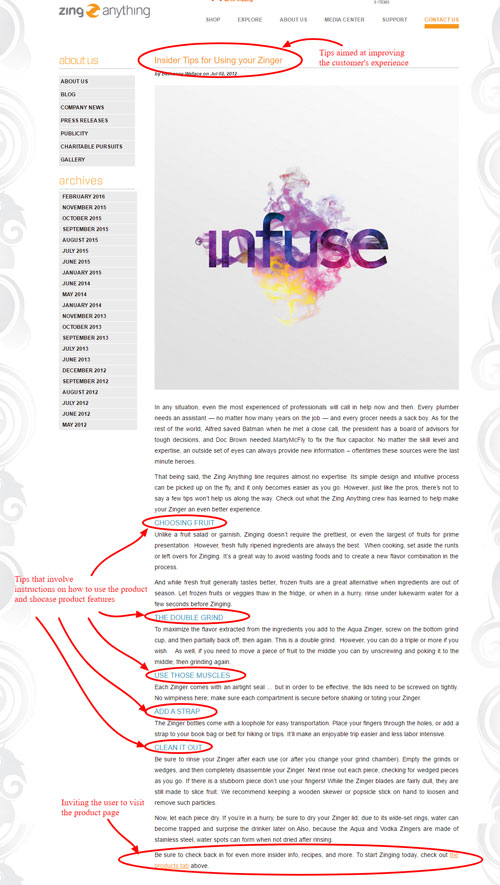
Other blogs may also involve these types of blog posts, but not as consistently. They can include a listicle or a “how-to” article, but their purpose is less about promoting the article and more about teaching a certain skill.
Also, their product reviews are usually sponsored by the companies and they offer their personal opinion and experience with the product rather than the explanation of the specific features and uses.
If they are not sponsored, then they are just descriptions of the blogger’s personal experience and opinion on the product.
Let’s see how Holly writes a product review piece about the Zinger bottle:
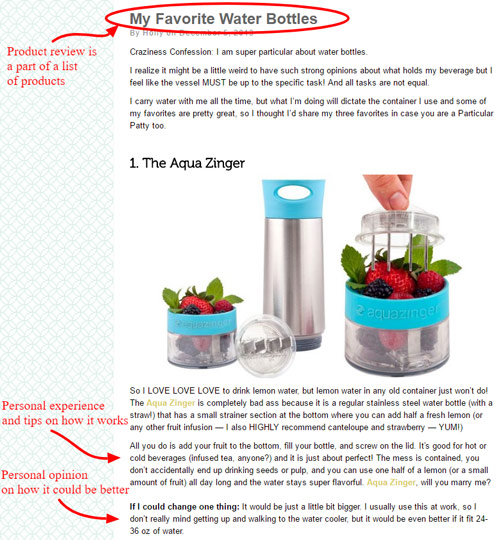
The section is packed with personal opinion and tips from Holly’s own experience with this bottle.
3. Writing style of the blog
eCommerce blog needs to maintain the writing style that is appropriate to the eCommerce store it presents. An eCommerce copywriter needs to write from the point of view of a company persona with a specific brand tone, voice and even vocabulary.
For example, if an eCommerce store blog is official and highly-professional, it requires a formal style of writing, carefully chosen vocabulary and most likely a third person writing.
There is not room for funny anecdotes, jokes, sentences in first person and similar features of a less-formal writing style.
eCommerce copywriter needs to maintain that style and they cannot change it without consulting with the eCommerce store owner or the PR team.
Let’s use the same examples gain.
Take a look at how Zing Anything writes a tip on how to use the Zinger. What can you say about the vocabulary used and the overall tone?
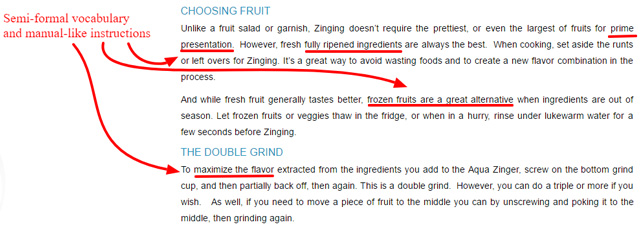
It is not entirely formal and you can possibly expect an anecdote here and there, but it is far from playful and carefree. This is the usual style of many eCommerce stores. A personal blog features its owner and is usually written in first person.
The tone is usually more conversational and the blog posts feature personal experience, opinions and similar content.
Now, let’s take one more look at Holly and her personal blog:

Her writing is very informal and her vocabulary in playful. Holly doesn’t have to watch her words or keep a company brand in mind when writing, because this is not an eCommerce blog.
Additional Tips and Further Reading for New eCommerce Bloggers
You can be informative, personal, entertaining, and educational in your angles. The most important thing to remember when you start blogging for your eCommerce store is to direct the information to your blog readers; otherwise, they might leave your blog without getting the information that they came for.
Here are some tips that might be interesting and useful when you start blogging: Pay attention to the content that can be found on your blog. If you write about certain products (technical equipment, fashion items, home-made cakes, etc.) then stick to them.
Do not post about things that are irrelevant for your readers. This can be challenging, if you have a very small niche, but it is far from impossible. Take a look at the Bee Friendly Skincare Blog. All the posts on their blog are about skincare.

The fact that the skincare line are made from bee products is not emphasised in every blog post, because, otherwise, it would be too difficult to write about them and stay original and relevant. Don’t make it just about selling the products but about the info you provide for your readers.
For example, Trunki sells luggage for kids, but their blog posts are not limited to that. They also offer great parental advice.
Their blog is full of interesting tips for travels with kids, games and other content that is relevant to the product but not about direct sale.
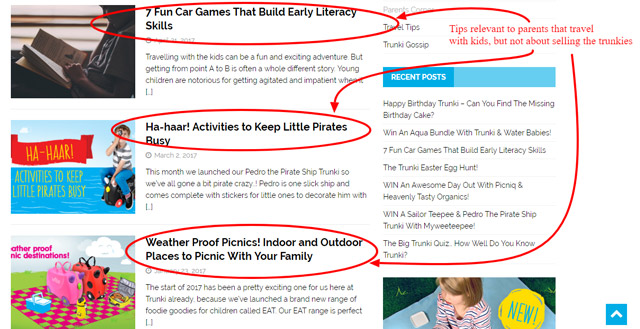
Post regularly. There is nothing worse than an interesting blog with a good domain that posts very rarely. But, how much is enough? Again, let’s consult HubSpot analytics and quote one of their blog posts:
“Companies that published 16+ blog posts per month got almost 3.5X more traffic than companies that published between 0 – 4 monthly posts.”
Learn a bit about SEO and social media. It can help you choose the right keywords, position the links better within your text, opt for a listicle instead of a different type of blog post and make similar decisions.
Below are some of the top sources we’ve picked to help you get started:
- Jeff Goins’ two SEO guides for bloggers, SEO Basics and Beginner`s guide to SEO.
- HubSpot offers a lot of tips and strategies which can help you boost your blog in the search engines.
- Pro Blogger Darren Rowse provides a list of pages where you can learn social media marketing tips in growing your blog traffic.
- Mashable has its list of ten social media marketing tips for bloggers.
In Summary
Creating a high-quality eCommerce blog is important for every eCommerce business because it helps it grow by appealing to both potential customers and search engines.
Therefore, becoming a good eCommerce blogger is a great step in your online career, because this specialisation makes you a very eligible employee for many eCommerce business owners. Here is a more detailed list about why is blogging for eCommerce important. In other words eCommerce blog:
- creates a personality for your brand
- educates your customers about your product and your brand
- allows you to repeat your message in an interesting way
- helps people decide to make the purchase
- gives a reason to share links with other traffic sources
- makes a great way to add keywords to the website
- allows you to create more inbound links
- increases traffic to the eCommerce store
For an eCommerce blog to be able to fulfill all these functions, it has to be well-written. To create such a blog you need to focus on the target audience, create an effective headline, write in an appropriate style and give the blogging design a thought.
Also, you need to be able to tell the difference between a regular and an eCommerce blog. The key difference is in the fact that the eCommerce blog is in the service of an eCommerce store and is a tool to help promote it and increase the sales.
Besides that, it also has specific blog post types and the writing style which has to be appropriate for the eCommerce store.
